Peter MALONE
Saturday, 18 September 2021 19:27
Big Fish
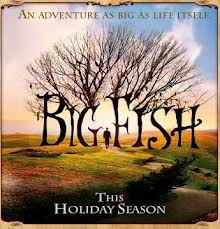
BIG FISH
US, 2003, 124 minutes, Colour.
Albert Finney, Ewan Mc Gregor, Billy Crudup, Jessica Lange, Danny de Vito, Helena Bonham Carter, Alison Lohman, Marion Cotillard, Robert Guillaume, Steve Buscemi.
Directed by Tim Burton.
For just a few opening minutes, it looked as though this could not be a Tim Burton film. What was he doing? Some father-son storytelling like A River Runs Through It? A straightforward piece of Americana? The doubts are quickly dispersed and we are back in Burton territory. Yet, it is unlike anything he has done before even if there are visual references to other films, like the box-house suburbia of Edward Scissorhands.
This is a film for those who delight in storytelling.
Once we have got our bearings, we find we are listening to a tall story about a larger than life fish, that Albert Finney is relating it at his son's, Billy Crudup's wedding. And, instead of it being an endearing situation, it is the occasion for alienation. It's the kind of film that defies a neat synopsis as it moves from present to past, from reality to fantasy, from story to story.
Albert Finney is masterful as he invents his life, especially as he comes to the end of it. Billy Crudup is earnest as his less than imaginative son who has heard the stories a thousand times but wants to understand his father before he dies. Much of the film is about his father as a young man who finds he has great talents, leaves town with a giant and finds himself saving a community, finding and wooing his wife and embarking on a whole lifetime of adventures from down the street to Korea. The young man is played with charm and supreme self- confidence by Ewan Mc Gregor. Jessica Lange has a smaller role as the mother and Helena Bonham Carter gives one of her
calmest performances as a mysterious woman who may be a witch.
That is description and a taste of the plot and performances. It is too difficult in words to communicate Burton's ability to create a different and wonderful world full of truly magic moments, a mixture of the mundane and the marvellous, the tragic and the comic, building up to an ending that diehard realists may be annoyed by but illustrates the wonder of storytelling.
1. The appeal of the film? Genial, happy? Storytelling? The dark side of human nature?
2. The films of Tim Burton, his capacity for creating fantasies? The blend of realism and imagination? Storytelling, visual impact, verbal impact? The references to Burton's other films like Edward Scissorhands?
3. The Alabama settings, the town, the magical town of Spectre, the world of the circus, the world of war? Texas and the open roads and the small towns and banks? A piece of Americana? The atmospheric score?
4. The title, Edward Bloom's initial story about the legendary fish, in the river, his trying to catch it, his achievement - at the moment that his son was born? The reappearance of the fish? The finale and Edward turning into the big fish? The story itself, its tone, significance? The later vision of the mermaid and the fish? The image in language of the big fish in a small pond, Edward being the small fish, wanting to go out into a bigger world? The various morals of the story?
5. The film's delight in storytelling: Ed, his telling the stories, his listeners? The doctor and his listening and confirming the stories? Jenny and her telling Will the truth about some of the stories? Will, his voice-over, his commentary about his father, hearing the stories, his anger at hearing the fish story at his wedding reception? The audience response to the stories, finding them fascinating, delightful, true lies? The difference between truth and embroidering imaginatively to give meaning? Reality and fantasy?
6. The film and its structure, the telling of stories, Will and his memories of his father, wanting to reconcile with his father and understand his truth, his father's illness and death? The insertion of the flashbacks, the perspective of Edward as a boy, as a young man, as an older man?
7. The character of Ed, having the two actors portray Ed, Euan McGregor? acting out the narrative, Albert Finney and his verbal skills in telling the stories? His life story, his son, telling the story at the wedding, the break of three years' lack of communication, Will and his phone calls to his mother, his father's illness, Josephine and Will returning to Alabama? Ed and his illness, indomitable spirit, facing his final illness - yet still telling stories to whomever will listen?
8. The character of Will, his job in Paris, a journalist seeking facts and the truth, the alienation from his father, the phone calls, his return home, seeing his father ill, comforting his mother, in the corridor listening to his father telling stories to Josephine? Taking up the meals, wanting to talk to his father? His sorting out his father's papers, the discovery of Jenny, going to visit Jenny and finding out the truth about his father? His father's final stroke, hospitalisation? His sitting with his father, coming to realise his truth, his father's story about looking into the witch's eye and seeing his death, not in a hospital? Will and his becoming creative, telling his father's story, involving all the characters, taking him to the river and his turning into the big fish? The funeral and the irony of so many of the characters being present?
9. The two Edwards and the personality of each, Edward as a young boy, with his friends, the house, the daring each other to look at the witch, knocking on her door, their all looking into her eye and the visualising of how each of them would die? Their fears, Edward courageous, forever having the memory of the witch and her friendliness towards him? His being ill for years, his growing out of all proportion? The years when he was away from all his friends? The boys, their rivalries, especially the tall boy?
10. Edward at eighteen, growing up, winning all the prizes, at school, the football, his being the champion, his friend and the rivalry? His success in the town, his volunteering to go and confront the giant? His offering to be eaten, the friendship with the giant, getting him clothes, reassuring the people of the town, leaving town with him, finding the detour, his going through the terrors of the forest, the dangers, the spiders, the fears? His finding the town of Spectre? The people of Spectre and their welcome, the young girl talking about his age and what would happen in ten years' time and her becoming Jenny? The authorities of the town, the welcome? His staying with them, meeting the poet? His continuing his journey, finding the giant, Amos Callaway and the circus, the giant finding his place in the circus? Edward and his vision of Sandra, wanting her for his wife? His staying and working with all the menial jobs in the circus, Amos giving him a clue each month? The years passing? His finding out the name of Sandra, going to visit her at college, her being engaged, his disappointment, the irony that it was his rival friend? The field of daffodils, the fight, Sandra and her breaking the engagement, her love for Edward? His going to war, the irony of his mission and the derring-do? The Siamese twins and their singing, the Chinese audience, his escape and taking the girls with him? His return and marrying Sandra? Buying the house? Becoming a salesman? His being on the road, going to Texas, the bank robbery and the irony of finding Norther? Helping him with the escape, the lack of money? His later visit to Norther with his success on Wall Street, getting the money to buy Spectre and bringing it back to life again? His helping to rebuild Jenny's house and her not selling it to him? His realising who she was? An extraordinary range of stories?
11. Edward, his vision of Sandra, time standing still, fast-forwarding, Amos and the information? His fighting with Don, skywriting his love for Sandra, marrying her? His absence on his war mission and its effect on her, the letter telling her that he was dead?
12. His adult life with Sandra, the birth of Will, bringing him up? Sandra and her continued devotion, her care for Edward while he was sick, bringing him meals, the companionship, in the bath? Her love for her son?
13. Jenny, Will finding her, her house, the story, Edward restoring it? Her place in Spectre, her love for Edward, his fidelity to Sandra? Her story of the revival of Spectre? Carl the giant and his straightening the house? Jenny and her reassurance to Will? Her selling the house to Edward and his owning and restoring the whole town?
14. The character of Carl, the giant, his booming voice, in the cave, people afraid of his hunger and his killing the animals? His meeting with Edward, the clothes, the haircut, being introduced to the town, on the road with Edward, waiting for him after his visit to Spectre? His finding his place in the circus?
15. Amos Callaway, the Danny de Vito style, the circus master, the range of people in the circus, the performance, the audiences? The fantasy of his being in his trailer, the movement, his racing out into the forest, Edward finding him, the fact that he was a werewolf?
16. Will and Josephine, the marriage, their life in Paris, her pregnancy, her wanting to be with Will, listening to Edward's stories, part of the family?
17. Will's final story of Edward's death, fulfilling what was in the eye of the witch (just as Don had died with the magazine in the bathroom as seen by the witch)? Everybody appearing in the story? Everybody coming to the funeral - as their normal selves?
18. Norther, his poetry, his twelve years to write two lines, at the river with the women? His failure as a poet? His robbing banks, failure at that? His friendship with Edward and finally lending him the money?
19. The enjoyment of storytelling - the hard and abstract nature of truth compared with imaginative interpretation?
Published in Movie Reviews
Published in
Movie Reviews
Tagged under
Saturday, 18 September 2021 19:27
Blue Streak
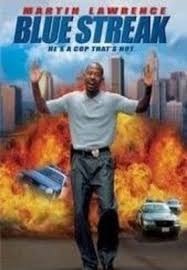
BLUE STREAK
US, 1999, 94 minutes, Colour.
Martin Lawrence, Luke Wilson, Dave Chappelle, Peter Greene, Nicole Ari Parker, William Forsyth.
Directed by Les Mayfield.
Blue Streak is a star vehicle for Martin Lawrence. After a television career and some films (including The Thin Line Between Love and Hate which he also directed), he became a star with Bad Boys. After appearing with Eddie Murphy (and he can be seen as a comedian in the tradition of Eddie Murphy) he made Life. Blue Streak, Big Momma's House, National Security, Black Knight are among the films he made on his own. For many, his over-the-top comic style is an acquired taste.
He is a jewel thief here who, after his prison term, wants to recover a jewel that he hid in an abandoned building but which has now become a police station. With a forged card as a policeman, he joins the squad, capturing criminals, thwarting escapes, eventually trying to recapture the diamond. He is partnered with Luke Wilson.
The film is enjoyable even if routine. Direction is by Les Mayfield, the director of routine films like Encino Man, Flubber, The Miracle on 34th Street.
1. Entertaining comedy? Police thriller? Combination of the two? The title and its tone?
2. The film as a star vehicle for Martin Lawrence, his screen presence, his personality, style, wit, slapstick humour, size? Partnering with Luke Wilson? The racial partnership? The serio-comic partnership?
3. Los Angeles, the opening sequences of the jewel robbery? The new police station? The precinct? The streets of LA, criminal activity? The desert? The musical score and the range of songs?
4. Miles Logan, as a robber, his team, comic style, the robbery itself, the diamond? Deacon killing his partners? His arrest? Coming out of jail, wanting to recover the diamond, discovering the police station?
5. His forged card, his becoming a policeman? Arrival at the precinct, searching for the location of the diamond? Stopping the criminal in the restrooms? The admiration by the police, his being accepted, promoted, on the streets? Partnering Carlson?
6. His adventures as a police partner, chasing the armed robber, stopping Tully? The activity behind the scenes, searching for the diamond, eventually finding it? The loss of the diamond, the heroin stash, the sting operation intended for the drug dealers? His frustrations?
7. The personality of Carlson, quiet, learning the black African style from Miles? The officials in the police station? Hardcastle and his wanting Miles along for the sting?
8. The sting in the desert, Captain Hardcastle, the shootout with Deacon, his death? The arrest of the dealers?
9. Miles learning that Hardcastle and Logan knew that he was the thief? Their letting him go in Mexico?
10. The relationship with his girlfriend, visiting her house, meeting her large cousin, her disdain for him?
11. The comic loner, petty criminal, genial?
Published in Movie Reviews
Published in
Movie Reviews
Tagged under
Saturday, 18 September 2021 19:27
Bruto, El
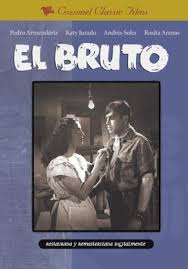
EL BRUTO
Mexico, 1953, 81 minutes, Black and white.
Pedro Amandariz, Katy Jurado, Rose Arenas.
Directed by Luis Bunuel.
El Bruto is a film by Luis Bunuel from his Mexican period in the early 50s. It was the period of such films as El, Wuthering Heights and Robinson Crusoe. The films did not have big budgets but Bunuel brought his talent to ordinary stories and gave them passion as well as insight into relationships and the nature of society. (Bunuel afterwards complained that the producers made him change his perspective on this film and he felt that it was just an ordinary melodrama.)
The film is interesting in its presentation of Mexican society in the early 50s (critics likening many aspects to Victorian England with its class distinctions, oppressions and the arrogance of the bourgeoisie). The film focuses on a rich man, his arrogant evicting of tenants so that he can pull down a property and build a luxury home. He has a younger passionate wife who becomes involved with El Bruto, the rich man's illegitimate son whom he has not allowed to inherit but who feels a debt to him. The Brute is involved in a greedy household who leech money from him. Persuaded to leave, he has to do the dirty work for the eviction of the tenants, especially physically attacking the ringleaders. El Bruto is a simple man, believes his father, is seduced by the young wife - but comes to learn the truth, is attached to the daughter of the man that he killed, is involved in a melodramatic expose of the truth which results in his killing his father, confronting the wife and eventually being killed himself. The irony is that the tenants will not have to leave because of the death of the patron.
Filmed in stark black and white photography, the film moves swiftly, is a mirror of an unfamiliar society - but is presented in a strong melodramatic way. Stars Pedro Amandariz and Katy Jurado appeared in a number of American films, Amandariz in many films by John Ford, Katy Jurado in this same year of El Bruto's production in High Noon.
1. The work of Luis Bunuel, his Mexican period, social observation, left-wing stances, passionate involvement?
2. Black and white photography, authentic atmosphere of a Mexican town, the heavy and melodramatic score?
3. The title, the focus on Pedro, his strength, social status? Expectations from the title?
4. The social background, the rich owner, his arrogance in evicting the tenants, using the police, specious reasons? H is reaction to the mob? His relationship with Pedro, the illegitimate son, not inheriting him, using him? Visiting the Brute’s household, disdaining them but giving them money? His own household, his pampered father, the young wife and her advice to use violence against the tenants?
5. The character of Andres, his age, background, relationship with the maid and father to the Brut, looking after his father, his relationship with his wife, her distance? Arrogance? The visiting of the Brut and the abattoir and discussion the plan with him, the use of violence, lack of scruple, his final anger with the Brut, believing his wife, the confrontation and his death?
6. Polona, the young wife, passionate, vanity in the mirror, snipping the flowers to give Andres the motivation to use violence? Attached to the Brut, passionate encounters with him, her treatment of Andres's father - and the drinking of the wine? Her jealousy, telling the young girl the truth, setting the police on the Brut, the final violence - and left alone?
7. The character of the Brute, his background, working at the abattoir, getting on well with everybody, his greedy household, his filial devotion to Andres, agreeing to move out of the house? Loyalty, confronting the tenant and punching him brutally, kicking him? The encounters with Polona? Working for his father, surveillance? The encounter with the young girl, the irony of his killing her father? Setting up the household, the tenderness, getting her the chicken, hopefully going to the movies? The promise of marriage? A transformation? Polona's visit, her jealousy, telling the truth, his going to confront Andres, the violence, killing him? Going to reconcile with his wife, helping those evicted, the brutality of his own death?
8. The young girl, the symbol of the oppressed, her father's death, the encounter with the Brute, loving him, pure, wanting a marriage? Setting up the household? The encounter with Palona, the truth and her being hurt, going back to the people, the Brute's attempt at reconciliation, his death? Confronting Palona?
9. The sketch of the old man, sick in bed, greedy, going to the cupboard, wanting his food? The symbol of the pampered previous generation?
10. The comparison with the Brute's household, the lazy mother in bed wanting her pills, pressure on her daughter, the crippled brother? Asking money from Andres? Continually begging - and perpetuating the class differences?
11. The portrait of society, arrogance and corruption, money and class, the preserving of traditional values? The possibilities of change - and the need for revolution?
Published in Movie Reviews
Published in
Movie Reviews
Tagged under
Saturday, 18 September 2021 19:27
Break of Hearts
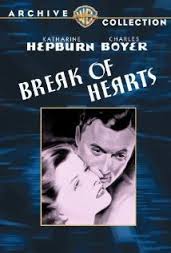
BREAK OF HEARTS
US, 1935, 80 minutes, Black and white.
Katharine Hepburn, Charles Boyer, Jean Hersholt, John Beal, Sam Hardy.
Directed by Philip Moeller.
Break of Hearts was one of Katharine Hepburn's earliest films. After success with A Bill of Divorcement, her Oscar for Morning Glory, Little Women, she appeared in a number of short running-time features which were popular enough, but did not enhance her reputation. While she continued to make some very good films, she was labelled box office poison. After renewing her career with The Philadelphia Story and her teaming with Spencer Tracy, she has never looked back as an actress. She is the only actress to have won four Oscars.
Here she was teamed with French actor Charles Boyer who was emerging as the heartthrob of Hollywood films of the '30s. John Beal also appears ?he had teamed with Katharine Hepburn in The Little Minister the previous year. There is a sympathetic performance by Jean Hersholt. The film was directed by Broadway director Philip Moeller. It is familiar material, soap opera done with Hollywood '30s style.
1. An entertaining melodrama? Soap opera romance? A vehicle for Charles Boyer? Katharine Hepburn? In its time? Now?
2. New York, black and white photography? The world of music and concerts? International flavour? The world of New York apartments? The musical score, especially the use of light classics to indicate the world of Franz Roberti?
3. The title, romantic, tragic? Indications of themes?
4. Katharine Hepburn's portrait of Constance, an aspiring composer, the quality of her work, her friendship with the professor, the encounter with Roberti, his listening to her music, her falling in love with him? The modern fairytale aspect of the romance? Her going to the theatre, the rehearsal? Their enjoying each other's company, his proposal? The happiness of the marriage? Constance's unreality? Her suspicions at finding Franz with the other woman? Her leaving? Her taking up with Johnny? The separation and its effect on her? Her attempt to become a woman of the world? The drinking and dancing at the New Year party? The new encounter? Franz's collapse? Her going to the concert? Finding him in the bar, restoring him to success?
5. Charles Boyer's style as Franz Roberti? His arrogance, skill, conducting? The visit to the professor and his gratitude to him? His ignoring of Constance, his making up for it? The rehearsal, his falling in love with her, the wedding? The dinner date? The clash with Constance? her walking out? His going on his international tour? His reputation, lady friends? The return, the New Year party, the drinking and the collapse at the concert? Constance's rescuing him and restoring him?
6. The sketch of the kindly professor and his support of both Franz and Constance? Johnny as Franz’s friend, his proposing to Constance after her divorce? The good friend?
7. Romantic themes? Reality/unreality? The devotion of the loving wife, marriage, love, career, success?
Published in Movie Reviews
Published in
Movie Reviews
Tagged under
Saturday, 18 September 2021 19:27
Boy from Oklahama, The
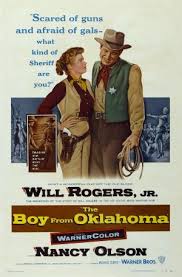
THE BOY FROM OKLAHOMA
US, 1953, 88 minutes, Colour.
Will Rogers Jnr, Nancy Olson, Lon Chaney Jnr, Anthony Caruso, Wallace Ford, Merv Griffin.
Directed by Michael Curtiz.
The Boy From Oklahoma is an amiable western. It has Warner Bros. production values of the '50s and is directed by Michael Curtiz, noted for his action and adventure films in the '30s, a series of dramas, including Mildred Pierce and Casablanca, in the '40s. During the '50s he moved to a group of musicals and comedies. He also directed the star, Will Rogers Jnr., in the story of his father, The Story of Will Rogers. Will Rogers Jnr has the amiable and laconic style of his father, the famous rope-twirling speaker of homespun wisdom.
The film is a murder mystery, not too difficult to solve, and uses the western conventions with tongue-in-cheek humour.
1. Entertaining comedy western? The murder mystery? The conventions of the western?
2. Production values: colour locations, the atmosphere of the West? Max Steiner's score?
3. The focus on Tom Brewster? Will Rogers and his genial style? His homespun sayings? His background? Studying for the law degree by correspondence? His arrival in Black Rock, the stagecoach being robbed, the loss of the mail?, Suspicions? His seeking out a solution, antagonism in the town? His pleasant way of handling enemies? The decision to Take him the Sheriff? His agreeing? His encounter with Katie, the problem of her father's death and his reputation? The villains in the town, troubles, clashes? The robbing of the stagecoach? The discovery of the Mayor as the villain? The happy ending with Tom and Katie? A conventional western hero ? with the likable touch?
4. Katie as the strong personality, the daughter of her father, his reputation, deals? Her urging Tom to investigate? her tough-mindedness, handling of situations? The happy ending?
5. The personalities around the town, at the saloon? Violence? The clashes with Tom? Suspicions, the stagecoach, the robbery of the mail? The editor of the paper indicating the truth? The fear because of the power of the Mayor?
6. Wally Higgins and his fears, suspicions, giving the evidence?
7. The Mayor and his control of the town? His posse? The engineering of the robberies?
8. The traditions of the American West? Law and order? Putting order into the frontier towns? Happy endings - the American heritage?
Published in Movie Reviews
Published in
Movie Reviews
Tagged under
Saturday, 18 September 2021 19:27
Bogie
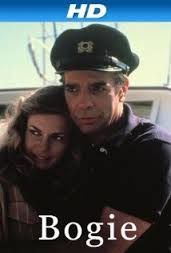
BOGIE
US, 1980, 100 minutes, Colour.
Kevin Mc Nally, Kathryn Harrold, Ann Wedgworth.
Directed by Vincent Sherman.
Bogie is a 1980 telemovie, a portrait of Humphrey Bogart. Kevin O'Connor sufficiently resembles Bogart for the sake of the film and offers his manner and mannerisms. Kathryn Harold is attractive as Lauren Bacall. Ann Wedgeworth gives an impressive performance as Bogart's estranged wife Mayo Methot.
The film traces Bogart's early career on stage and on screen, the tangle of his marriage with Mayo Methot, the war years and his change from character actor to star and his encounter with Betty Bacall. The film idealises their marriage. It then builds up to Bogart's final illness, his battle with cancer and death.
The script is by Daniel Tarradash, author of such screenplays as From Here To Eternity. Direction is by Vincent Sherman who directed many Warner Bros films of the '30s and '40s including some Bogart vehicles like All Through The Night.
1. Audience interest in Humphrey Bogart? As a personality? His films? A cult figure many decades after his death? Television and film societies perpetuating his memory? The telemovie as a memoir and tribute? Sufficient offered of the person and his career in this telemovie?
2. The evocation of Bogart as a person, film star, his films?
3. The period of the '30s to the '50s? The re-creation of Hollywood, California and its lifestyle?
4. Authentic characters introduced into the screenplay: Mayo Methot, Leslie Howard, Betty Bacall, Howard Hawks, Michael Curtiz, Peter Lorre etc? How satisfactory the impersonations? Throwing light on Bogart's career and his relationship with these people?
5. Bogart's background, acting, his father and his death? The serious side of Bogart and his life? His work in The Petrified Forest? The audition? Success? The growing list of films and the collage of these? His changing image? The Bogart persona? The real Bogart?
6. His relationship with Mary, the separation? The encounter with Mayo and his being a Slugger? The vigorous relationship, their life together, scenes, gossip, marrying? Enjoying life together? Drinking? Mayo going down, depression? Her career? Bogart trying to cope? Mutual angers? Treatment and failure? Her attempt at stabbing him? The inevitability of divorce?
7. Bogart's meeting Betty Bacall, the audition, staring, the easy relationship? Mayo in the background? Their falling in love? The decision to marry? Children? The moods? Their work together? Bogart's continued success? The ambition of buying the yacht? Relationship with Hollywood friends? Their lifestyle? The '50s and his illness building up to his death?
8. The sketch of Lauren Bacall: tough, nice? young? Her career? Children? Devoted to Bogart? His illness and death? The children and the sailing?
9. The background of Hollywood, films, publicity, the producers and directors?
10. Bogart's achievement? As a film star? His age? The significance of his illness and his final decisions? The ending with his yacht, the sea, his belief in God?
11. How satisfying a movie biopic?
Published in Movie Reviews
Published in
Movie Reviews
Tagged under
Saturday, 18 September 2021 19:27
Boeing, Boeing
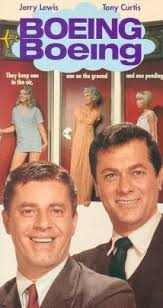
BOEING, BOEING
US, 1965, 102 minutes, Colour.
Tony Curtis, Jerry Lewis, Dany Saval, Suzanna Leigh, Thelma Ritter.
Directed by John Rich.
Boeing Boeing is a humorous sex farce, very similar to the old fashioned style of Feydeau but updated to the jet age; hence the title. A journalist juggles his timetable to able to live with three air hostesses. Tony Curtis in the mid 1960s was at home with this kind of suave playboy role. He is supported by Jerry Lewis in what was really Lewis' only straight role. There is some comedy by Thelma Ritter. The direction was by television director John Rich, who made such films as Wives and Lovers. Distinguished writer Edward Anhalt adapted the play by Marc Camoletti. Typical of the sex comedies of the time.
1. The significance and emphasis of the title, indications of comic themes? The quality of the film as a comedy?
2. What is the perennial appeal of farce, bedroom comedy, mistaken identities, comic quick pace? How good an example of this kind of farce was this film?
3. The quality of the comedy, colour, Paris settings, the modern apartments, airports, press agencies?
4. The appeal of Tony Curtis and Jerry Lewis? Their individual styles, their blend for the success of this comedy?
5. How credible was the plot? Did this matter? The comic aspects of the plot, the moralizing aspects?
6. How did the film question traditional morality, while keeping traditional morality as its base? Did it have double values?
7. The picture of the set-up, Bernard's handling of it? His timetables, quick changes, furniture and meals, his patter about what was going on? The particular qualities of Bernard's personality, strengths and weaknesses? The typical American male? His attitude towards himself, towards women? Selfish and hedonistic?
8. Bertha's contribution to the apartment? The comedy style, her age and hard work, the meals and the criticism of her work? The strength of the comedy in Thelma Ritter's performance?
9. The personalities of the three girls? Their characters, infatuation with Bernard, their nationalities and national traits, the air firms for which they worked? Their pride in their work etc.?
10. The importance of Robert's intrusion into this world? His amazement, his using it, the detective agency to get the flat etc.?
11. The humour of the Boeings and the development of their speeds
12. The farcical situation and mistaken identities within the 1 apartment, the meals, the car chases? How satisfactory was the humour?
13. How satisfying was the resolution? Traditional morality prevailing?
14. What is the universal appeal of this kind of comedy?
Published in Movie Reviews
Published in
Movie Reviews
Tagged under
Saturday, 18 September 2021 19:27
Blood of Hussain, The

THE BLOOD OF HUSSAIN
UK/Pakistan, 1981, 112 minutes, Colour.
Saalman Perzeda, Kika Markham, Durriya Kazi.
Directed by Jamil Dehlavi.
The Blood of Hussain is a Pakistani film, completed in England. The filming was completed during 1977, just before the military coup. The director escaped from Pakistan and completed his film in Great Britain. This gives the film political and historical interest.
The plot echoes Pakistani situations and is an interesting reflection on Pakistan in the 70s. The film focuses on Hussain, a hero figure, who has within him the spirit of a great 17th century martyr who was grandson of Mohamed. The film highlights the place of Islamic beliefs and zeal in Pakistan. The contrast is with Hussain's brother, married to a westerner who is unfaithful to him and who has, a business mission to Washington. The film contrasts the two brothers, the one dealing in compromise, the other a leader of his people, rallying the people together, dying heroically in battle against the army.
The film works well on a realistic level but is given a symbolic framework with a sequence at beginning and end as a white stallion seems to rise out of the ground.
1. An interesting and entertaining film? The Pakistani story? The reflection on issues in Pakistan? Its history? Politics?
2. Colour photography, location photography? Domestic sequences? Action sequences? The symbolic stallion? The musical score?
3. The title and the focus on Hussain as hero? His childhood experience? His being filled with the? spirit of Imam; Hussain? The spirit of Mohamed?, an Islamic hero? A hero of the people? His wife's death? His leading the charge against the troops and his heroic death? A saviour martyr figure?
4. The portrait of Hussain: the childhood experience, the wealthy family, the encounter in the desert, the words of the fakir, his being filled with Mohamed's spirit? The later military takeover? The contrast of the way of life of his older brother, Selim? Selim and the overseas connections? Hussain and his staying in Pakistan? Hussain's marrying, the happy marriage, the birth of the child? Hussain leading opposition against the authorities? The destruction of his home? The death of his wife? Hussain as a rebel, leading the campaign, the battles? In the desert, trapped by the government troops? The plea for water for his young child? Zahid shooting the child? Audiences sharing Hussain's outrage? The dramatic impact of his leading the charge against the troops and his Loyal girls death? A Pakistani hero?
5. The contrast with Selim? The same background? His becoming a successful businessman? The mission to Washington? His being a servant of the military government? The influence of the General? The warnings to stop Hussain and his rebellion? Selim's English wife? Her having an affair? Selim following her? His being trapped by his position? His having to accept the situation? His opposition to Hussain's marriage? Selim as a victim of compromise?
6. The military authorities, the takeover of the country? The General and his callousness? Shooting
Warnings to Selim about himself? About his brother? The presentation of the military?
8. Zahid and his role as the General's security aide? His affair with Katherine? The fathering of the child? Zahid and his ruthlessness? In the battles? The callous shooting of Hussain's child?
8. Matherine, the outside, the Englishwoman married to Selim? Her dissatisfaction with the marriage? The affair with Zahid? Her pregnancy? The symbolic nature of the ruthless and unfaithful outsider?
9. The presentation of the people: the workers, oppression, insurrection, battles? The place of women in Pakistani society? The fidelity of Hussain's wife contrasting with the infidelity of Selim, his wife? Children and the callous treatment?
10. An emotional film? For Pakistani audiences? International audiences. An opportunity to understand the ethos of Pakistan? Islam?
Published in Movie Reviews
Published in
Movie Reviews
Tagged under
Saturday, 18 September 2021 19:27
Blob, The
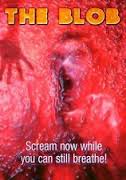
THE BLOB
US, 1988, 95 minutes, Colour.
Kevin Dillon, Shawnee Smith, Donovan Leitch.
Directed by Chuck Russell.
The Blob is a big-budget remake of the 1958 B-budget classic. The Blob introduced Steve Mc Queen to a wide audience. In the remake, the plot is updated, the special effects and stunt work are effective. There is also an underlying message in this film against government authorities, U.S. chemical warfare experiments, an attack on religious fundamentalism and its dangers in bringing about Armageddon.
Kevin Dillon is an agreeably surly hero. Shawnee Smith is the attractive and plucky heroine. The film echoes the original, but is done with some flair. Direction is by Chuck Russell who directed the second of the Nightmare on Elm Street films.
1. An enjoyable science fiction horror film? Of the 80s?
2. Small-town America: the town, authority figures, family, the police? The government and experiments? Death and expendable people? The anti-war tone of the film?
3. The poking fun explicitly at the slice and dice horror movies? The Garden Mower Massacre? The poking fun at families and youngsters going to such films, poking fun at youth and sexual permissiveness, the condom sequence? Poking fun at movies? At fundamentalist preachers and their dangers?
4. The remake of the original, updating: the town, effects and horror, the score?
5. The credits and the town, the church, the empty town and suddenly everybody at the sports arena? The emphasis on American traditions, family, dating, the clergy? Fran and her work at the cafeteria? the stock genial character?
6. The introduction to Paul as sports hero, the expected hero of the film, relationship with Meg, dating her, preparations for the outing? The contrast with Brian as the stereotype rebel?
7. Brian as anti-hero, the bike and his practising the lump, the encounter with the old man, the police pursuing him and criticising him, his anti-authoritarian stances, the irony of his being the hero and Paul's dying?
8. The Blob and its landing, the old man seeing it, it getting onto his hand, axing it off, getting the lift with the kids, going to the hospital, his horrific death, Paul seeing it and Paul's horrific death?
9. The doctors, Meg's reaction, going home, disbelief, the police? Meg going to find Brian, his reluctance, her persuasion? Their getting on well with each other as well as fighting?
10. The Blob in the hospital, its going on the rampage and increasing, its killing of George at the diner, the pursuit of Fran into the telephone box, Herb as the good policeman and his being devoured by it, Kevin and Meg hiding in the refrigerator? its going to the theatre and overcoming the projectionist, pursuing the patrons through the theatre, the Reverend and his mania, taking the globules and keeping them, its going down into the sewer and pursuing Meg and the boys, taking the cheeky boy and killing him, its pursuit of the soldiers, its going into the hall, Bill? Taking the policeman? The explosion, the quake and the snow? The destruction of the Blob and the irony of some remaining?
11. The picture of the military and their presence, sudden arrival, their suits, the story of the virus, Dr. Meddows and his lies, Brian and Meg pursued by him, callous attitudes, the sewers, the explosion, his death from The Blob? Critique of chemical experimentation and U.S. militarism? Secrecy?
12. Meg and her strength, at home, her parents, her brother? Out with Paul and his death? Working with Brian? The theatre and saving the boys? In the sewers? Helping Brian with the snow machine?
13. Brian as tough, his background, yet his sentiment? Escaping from Dr Meddows, in the sewer, getting the truck and saving the day with the snow?
14. The police and their toughness, Herb and his genial help but his death? Bill and the shoot-out? His being taken through the wall?
15. The gallery of characters: parents, the boys and their cheekiness, the satire on the Garden Mower Massacre type film? The pair in the car and their being killed? Fran and her help, Herb?
16. The Reverend and his preaching, the Jerry Falwell type of Fundamentalist preacher, his finale in the tent and his having the globules: the self-fulfilling prophecy of doom?
Published in Movie Reviews
Published in
Movie Reviews
Tagged under
Saturday, 18 September 2021 19:27
Betrayed
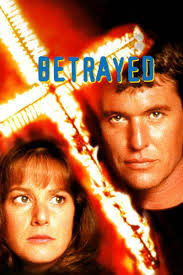
BETRAYED
US, 1988, 127 minutes, Colour.
Tom Berenger, Debra Winger, John Heard, Betsy Blair, John Mahoney, Ted Levine.
Directed by Costa Gavras.
Betrayed was written by Joe Estzerhas (Jagged Edge, Checking Out, Basic Instinct) and is an exploration of right wing extremism in Middle America. It was directed vigorously by Costa Gavras, director of such political films as Z, The Confession, State of Siege, Special Section, Missing.
The film was poorly received in the United States, accused of being exaggerated and ludicrous, especially the screenplay. However, audiences outside America were impressed by its look at the move towards neo-Nazi style fascism.
Debra Winger is a vigorous heroine, infiltrating a community to investigate the murder of a controversial radio personality (briefly but excellently played by Richard Libertini), Tom Berenger is an attractive widower (Betsy Blair his mother) who eventually turns out to be the head of a group of neo-fascists. The agent falls in love with the farmer but has to infiltrate the group further and ultimately bring him to justice.
There is a good supporting cast including John Mahoney as one of the fascists and John Heard as an investigator. The film is quite emotional in its presentation of the relationship, the introduction of the farmer's children. It is also emotional in the pressures put on the agent as she falls in love but is repelled by what she sees. There is also the final confrontation in her bewilderment after having to kill the farmer.
This is one of a series of films about neo-fascism in the United States in the late 80s and includes such thrillers as Burt Reynolds' Malone, Don Johnson in Dead Bang.
1. The impact of the film, its themes and treatment? Reception by American audiences?
2. The Midwest locations, Chicago, Middle America? Farm life, homes, church? The meetings and the rallies? Musical score?
3. The title and its references: to Gary and the United States, to Cathy, to his family? Cathy and her relationship to Gary? American betrayal by neo-fascists of Constitution ideals?
4. The opening with Kraus and his radio programme, the frank talk, the phone-ins, the talkback phenomenon, issues, sex, religion, race? His provocative style? The angry callers? The assassination in the car park? The posters round the countryside, the FBI, starting an investigation?
5. The contrast with the wheat fields of the Midwest, Cathy working the harvester, meeting Gary, the children, giving then rides, the homeliness of the Deal, friendship with Mrs Simmons, the bond between Cathy and Gary, meeting together, falling in love, sexual liaison? Her going back to the favourable comments about Gary, their interrogation about guns and ideas?
6. Cathy and her relationship with the F.B.I., her background and recruitment? Michael and the officers? Their discussion, his gut feeling, their work and theories? Pinpointing Gary, the evidence? Urging Cathy to return? Giving her the gun?
7. The visit to the church, the teaching, the condemnation of America? Amen? Gary and the dispute, the people avoiding him? His outbursts? His explanation of himself, his inviting Cathy to go to the hunt? Her going, Shorty and the others present? The set-up of the hunt, the dogs, the black and sending him out with five bullets, catching bin, wounding him, inviting Cathy to shoot him? His being killed? Gary's explanation that he wanted to show her the extent of his love and for her to understand him completely?
8. Falling in love with Gary, their passionate encounters2 The effect on each? Her ease with the children, playing with her, goodnight, the secrets and her shock at listening to their racist attitudes? Cathy and her trying to fit in? Being taken to the camp, Amazing Grace and the Ku Klux Klan rally, the burning cross? The shooting practical and her learning to shoot? The racist school for the children? The rendezvous in the night, Cathy following, the danger, Wes catching her? Wes aware of the truth, telling Gary that she was F.B.I?
9. The political candidate on television, his aid? At the camp, his speech, his adviser, Gary hostile? Gary and his computer, the lists of the network, the list of victims?
10. Gary and his explaining his life (and the F.B.I. information)? His father. suicide, Vietnam war and his rescue and decoration, his wife and the estrangement, her dislike of his bigotry, her trying to influence the children, leaving, Wes murdering her in California? His bond with Cathy? Her not wanting him to be hurt again? His showing her the list? Wanting to marry her?
11. Cathy and her going back to the offices, the waiting two hours and the tension, supplying the information and the lists, their being photographed? Her phone calls in the middle of the night? The build-up to the robbery, her participation her shooting the guard? Wes being shot by the F.B.I. agent and thus freeing her? The plan for Denver?
12. The ending of the film, the aide arriving and giving the truth to Gary, giving the file on Cathy? Gary not telling her? In the night, holding her hand? Going for the hit, the change of plan, Cathy's devices to contact the F.B.1? In Chicago, on the roof, Gary asking her about the truth, her arresting him? Having to kill him? The alternate sniper for the assassination? The aide and the original plan to take over, his going on television?
13. Cathy and the effect on her emotionally, wandering the countryside, the seasons passing, going back to the children, re-meeting Rachel, her waving goodbye, the secret, Hope for the future?
14. The sketch of the minor characters, the children, their charm, their racist indoctrination? Gary's power? And his checking with her on the phone about Cathy ringing?
15. Shorty, Wes, the ordinary personalities of the farmers, yet their racism and bigotry? Their presumption about pure America?
16. The sketch of the F.B.1. agents, their work, their hypotheses, phone calls and cover stories?
17. The spread of right-wing groups in the United States and around the word in the late 80s, neo-Nazism? The credibility of the film?
Published in Movie Reviews
Published in
Movie Reviews
Tagged under